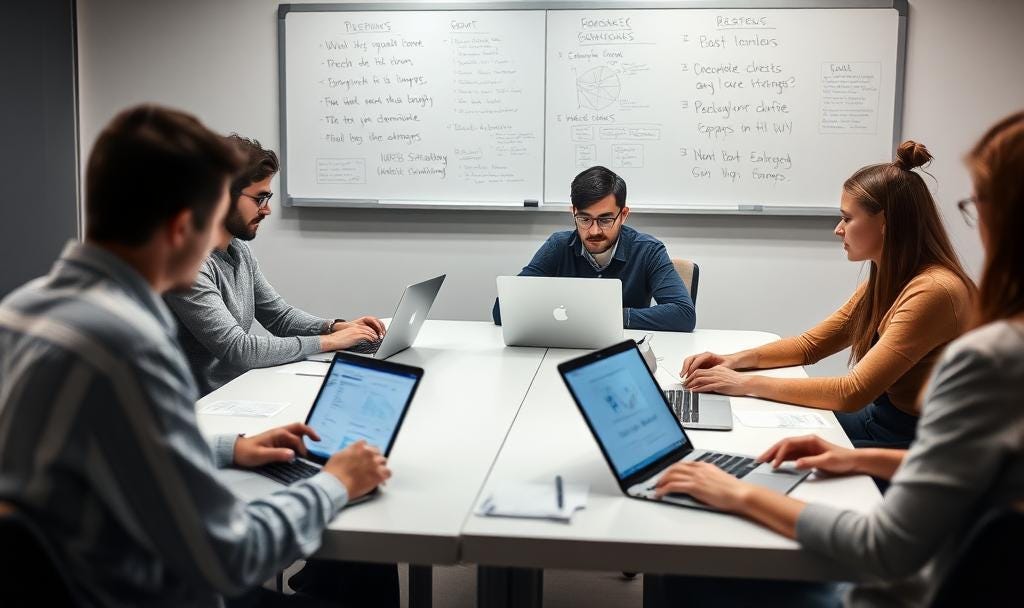My I2I (Insight to Impact) on AI and our thinking:
Productivity vs. Capability: We're getting better at producing content, but are we getting worse at thinking?
The Rise of Cognitive Debt: Like financial debt, offloading our thinking to AI offers short-term ease for long-term cognitive cost.
The Solution is Cognitive Stewardship™: A framework for using AI to augment—not atrophy—our team's most valuable asset: their minds.
Here’s what I’ve learned and what you can do about it...
Recently, a colleague described a strategy meeting involving a team of bright individuals tackling a complex market-entry problem. The scene was familiar: a conference room, a whiteboard filled with notes, laptops glowing softly. Yet, what struck him was the unusual silence. Instead of lively debate, team members individually queried large language models for strategies, competitive analyses, and risk assessments.
The energy was not interpersonal; it flowed between each person and their device.
Have you observed similar dynamics in your own meetings, where human interaction yields to solitary device engagement?
After more than a four decades guiding businesses through successive waves of digital transformation—from the shift to the cloud and agile methodologies to the current AI integration—this pattern has become increasingly evident. We are becoming exceptionally adept at outsourcing our cognitive labor, first to search engines and now, with remarkable speed, to artificial intelligence. This evolution prompts a critical question: Are we trading away fundamental cognitive abilities in our pursuit of efficiency? As an IT consultant, I have witnessed these shifts firsthand and believe it is essential to examine their implications.
The Memory Palace We Never Built: The Google Effect
Reflecting on a 2011 study from Columbia and Harvard that identified the "Google Effect," the researchers found that when individuals know information can be easily retrieved later, they are less inclined to commit it to memory. Instead of internalizing the data, our brains efficiently store the pathway to it—the cognitive equivalent of recalling a file's location but not its contents.
This phenomenon echoes a metaphorical warning in Stephen King's 2001 novel "Dreamcatcher," where characters maintain "memory warehouses"—vast mental repositories. Those who rely excessively on external sources find their internal stores weakening, particularly in moments of crisis when independent recall is vital.
In my consulting work, I have observed this dynamic repeatedly. Developers facing novel bugs often turn immediately to Stack Overflow rather than reasoning from first principles. Marketing managers pull generic "7-step content strategies" from top-ranking blog posts instead of analyzing unique customer data to craft bespoke plans. These tools provide access to vast knowledge repositories, yet they introduce a subtle downside: teams excel at sourcing answers but falter in building deep, durable understanding. The intellectual muscles for synthesis and recall gradually weaken. How frequently do you bookmark solutions rather than internalize them, and what long-term impact does this have on your expertise?
A recent example illustrates this clearly. I was speaking with one of our clients, and they told me a story about how a talented mid-level software engineer dedicated most of a day to implementing a complex caching solution sourced online. The code resolved the immediate issue effectively. However, two weeks later, a similar but distinct caching challenge emerged in another application segment. The engineer returned to square one, initiating a new search rather than adapting prior learnings. No deeper knowledge had been forged; the process remained transactional, not educational. Have you encountered such cycles in your projects, where knowledge feels transient rather than accumulated?
AI: Accelerating the Trend in Overdrive
If search engines externalize our memory like an auxiliary hard drive, artificial intelligence automates the processor itself, intensifying cognitive offloading to a qualitative new level. Search engines demand active engagement—reading, evaluating, synthesizing, and applying information—while AI delivers polished outputs, such as essays, code blocks, or reports, in seconds.
A recent MIT preprint study underscores this escalation, monitoring brain activity via EEG among 54 participants aged 18-39 during SAT-style essay writing tasks. Divided into groups using ChatGPT, Google Search, or no digital aids, the results revealed stark differences. ChatGPT users displayed the lowest neural engagement, with diminished activity in regions associated with executive control, attention, creativity, and memory formation—up to 55% lower cognitive involvement compared to the unaided group. Their essays, while efficient, were deemed generic and "soulless" by evaluators, lacking unique voice or originality.
Alarmingly, when these participants attempted to rewrite without AI, they struggled to recall the substance or structure of their prior work. They had served as conduits, bypassing the cognitive processes that encode knowledge deeply. In contrast, the no-aid group exhibited peak creativity, originality, and retention, while Google users maintained moderate engagement through active synthesis. In your workflows, does AI assistance for initial drafts result in similar challenges with ownership and recall of the final output?
What I'm Seeing in the Field
This research aligns closely with observations in professional environments. I have deployed AI copilots, yielding productivity increases of 20-30%—impressive metrics. Yet, junior staff often develop dependencies, circumventing the essential trial-and-error that forges expertise. The "why" underpinning solutions fades, supplanted by frictionless delivery of the "what." How has this influenced skill development or onboarding in your organization?
A secondary consequence is strategic convergence. Strategy sessions increasingly feature AI-generated SWOT analyses and market reports that sound eerily alike, stemming from models trained on shared internet corpora producing statistically average outputs. When teams or industries lean on identical tools for core thinking, outcomes homogenize, potentially eroding competitive edges and promoting groupthink.
"My team produces twice the content volume, but I'm not convinced they think twice as well."
A CTO overseeing hundreds recently articulated this concern: "My team produces twice the content volume, but I'm not convinced they think twice as well." The focus shifts from mere productivity to enduring capability—the organization's aptitude for addressing novel complexities.
Finding the Right Balance: The Gym Analogy
As a technology professional, I do not advocate rejecting these advancements and becoming a digital Luddite; rather, we must pursue smarter work. Tools have long handled routine cognition, liberating us for intricate challenges. Science fiction anticipated this: Star Trek's tricorders, once futuristic, now parallel our smartphones and tablets, supplying data without supplanting human judgment.
Consider the gym analogy: weight machines provide structured resistance to build strength, but the user must exert effort—the machine does not lift for us. From looking at my current physique, I need more time on the pulling end of weightlifting, not just watching the machine do it for me. The struggle cultivates muscle. Similarly, cognitive tools should augment thinking, not eliminate it.
The threshold is breached when productive mental effort is removed, fostering atrophy.
Practical Steps: The Cognitive Audit and Cognitive Stewardship
To address this, I am introducing a practice I call “Cognitive Stewardship.” This approach transcends simple productivity metrics by focusing on the long-term health and capability of our intellectual assets. It begins with "cognitive audits" that evaluate the deeper effects of tool integration:
Clarify AI's role: Is it for ideation and overcoming blocks, or generating unedited finals?
Ensure comprehension: Foster norms where AI outputs must be explained and defended.
Gauge expertise growth: Evolve training to position AI as a deep-work collaborator, not a bypass.
From this foundation of Cognitive Stewardship, we can implement practical guardrails:
Mandate Analog Brainstorming: Initiate key sessions device-free, drawing from memory and dialogue on whiteboards to spark novelty. Have you experimented with such approaches, and what outcomes emerged?
Institute the Feynman Technique: Mandate explaining AI-generated content in one's own words, as to a novice, exposing understanding gaps.
Prioritize Manual Deep Work: Tackle critical issues manually first, then employ AI for refinement, preserving foundational models and human oversight. What safeguards have you adopted to sustain cognitive vitality?
Bottom Line: The choice isn't between technology and humanity, but between passive cognitive offloading and active Cognitive Stewardship™. The insights from MIT and our own professional lives are clear.
My Insight to Impact (I2I) challenge to you is this:
What is one specific action you or your team will take this week to move from insight to impact on this issue?












Share this post